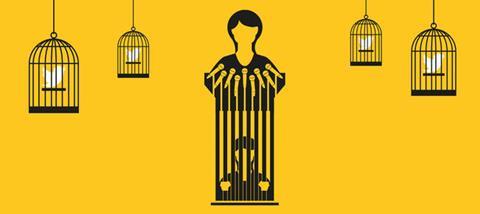
In October 2015, students at Cardiff University campaigned to have the famous feminist Germaine Greer ‘no-platformed’. Greer, 76, was already scheduled to give a major lecture on ‘Women and Power: The Lessons of the 20th Century’.
The petition launched by student union women’s officer Rachael Melhuish, which received over 3,000 signatures, aimed to have the feminist writer disinvited. Why? Because Greer had ‘demonstrated misogynistic views towards trans women’, views deemed deeply offensive.
It isn’t just radical feminists who have been causing offence. In December, an online petition to see Tyson Fury, boxing’s new world heavyweight champion, removed from the shortlist for the BBC Sports Personality of the Year, gained nearly 140,000 signatures. The petition objected to offensive statements he had made on homosexuality and women (though police dropped their investigation into the boxer). Meanwhile, Presbyterian pastor Rev James McConnell stood trial on charges of inciting religious hatred after branding Islam ‘satanic’ in a sermon at Whitewell Metropolitan Tabernacle in Northern Ireland. In the end, Pastor McConnell was found to be not guilty of the charges (see 'Is free speech under threat?').
While some who have come under fire for their words have subsequently apologised, not so Germaine Greer. In an expletive-laden interview she said: ‘Just because you lop off your d**k and then wear a dress doesn’t make you a f****** woman.’ The veteran women’s rights campaigner has also said that trans people who undergo sex-change surgery are ‘inflicting an extraordinary act of violence on [themselves]’. And ‘if you didn’t find your pants full of blood when you were 13 there’s something important about being a woman that you don’t know.’
In the end, Greer defied the protests and gave the lecture, making no mention of the transgender issue (since she had never been booked to speak on that theme). With police officers standing guard outside the lecture theatre, she told the audience that despite campaigners ‘trying to frighten me off’, ‘here I am’.
Rather than comment on the transgender issue (and risk being no-platformed forever), I want to reflect on an even more controversial question: Is there a right to offend?
OFFENSIVE FEMINISM
There is an extraordinary irony that it was Germaine Greer who became the object of a university’s scorn this autumn. In October 1970, Greer published one of the seminal books of second wave feminism, the international bestseller The Female Eunuch (HarperCollins).
The thesis of the book was that the progress made by first wave feminists (‘the old suffragettes’) had plateaued. A woman’s life has become even more ‘immobile’ and even more ‘predictable’, and the home more of a prison than ever before.
The Female Eunuch was a wrecking ball to smash patriarchal society to bits.
"THE RIGHT TO OFFEND IS WHAT FREE SPEECH LOOKS LIKE IN PRACTICE"
But here’s the point. In the introduction to the book, Greer openly discloses her intention: ‘Hopefully this book is subversive. Hopefully it will draw fire from all the articulate sections of the community.’
In other words, hopefully it will offend you.
According to the Cardiff student union’s logic, The Female Eunuch would never have seen the light of day. Majority opinion was patriarchal. That was the orthodoxy. That constituted mainstream thought. So Greer’s voice was a dissident one, and the ideas so vividly expressed in The Female Eunuch would not have been aired for fear of offending people. Second wave feminism might have been strangled in the cradle.
MUZZLING FREE SPEECH
The worrying thing right now is that Greer is no outlier. In February, Oxford students took to the streets to protest the invitation to Marine Le Pen, leader of France’s National Front, to speak at the Oxford Union. Demonstrators delayed her speech, forcing security guards to close the doors of the university’s famous debating chamber. ‘The people of Oxford,’ commented Oxford councillor John Tanner, ‘don’t want this extreme right-wing racist from France given a platform here.’
No-platforming undermines the very idea of the university. The university is supposed to be an intellectual marketplace, an agora of ideas, a venue for the exchange of opinion. When I was at Oxford, over ten years ago, I encountered all kinds of organisations I wouldn’t dream of joining – from the Oxford Hayek Society to the Oxford Marxists to the Isis newspaper (named after the river, not the terror organisation).
At Freshers’ Fair, you’re bombarded with a flurry of tracts; weighed down with a wealth of literature; overwhelmed by invitations. That was what a pluralistic university in a pluralistic society looked like. Student newspapers ran controversial Op-Eds questioning the entrenched class system, and the Honourables had to put up with it. Professors were criticised, to their great annoyance. The Christian Union hosted explicitly evangelistic missions calling students to repent of their sin. The Student Union campaigned for gay rights. And – shock horror – I encountered ideas with which I disagreed.
Yet it was assumed that the intellectual ability that had gained you admission in the first place would translate into an openness to new ideas, and an intellectual robustness – an ability to be thick-skinned – which meant you could entertain an idea without being mortally offended by it.
The important thing was when the most controversial figures came to speak – the Holocaust-deniers or the BNP – when you heard someone who was, ideologically, persona non grata, it forced you to think. No longer could you lazily rely on your borrowed instincts. Instead you had to return to the evidence; immerse yourself in the arguments; revisit your principles; shore up your positions.
The irony, then, is that the kind of censorship which no-platforming constitutes can end up entrenching prejudice by foregoing argument.
"THE LOSS OF A RIGHT TO OFFEND WOULD ENDANGER CHRISTIAN MISSION"
WHEN TWITTER ATTACKS
The assumption underlying no-platforming is that you should only share the stage with people whose opinions you endorse – the very essence of totalitarianism.
The right to offend is what free speech looks like in practice, and the whole point about free speech is you don’t pick who gets to enjoy it. It cuts both ways. You’ve got to give as much airtime to conservative views as liberal ones, equal time in debate to secular and religious views, the same column width to progressive and traditional opinion.
Germaine Greer was worried about having things thrown at her if she went to speak at Cardiff University. A far worse fate, arguably, is the torrent of abuse thrown at you when you happen to express on social media an opinion other people find offensive. Express the wrong view, or even the right one but in the wrong way, and wait for the maelstrom. Wait to be labelled a TERF (trans exclusionary radical feminist). Wait to be ostracised. That’s the price of giving offence. And the effect? Like any kind of censorship, the effect is to curtail free speech, to make people too afraid to express their views.
Recently the journalist Helen Lewis wrote perceptively in The New Statesman: ‘The fact that the trans rights struggle is the first progressive cause to come of age in the time of Twitter leaves anyone who wants to explore the thorny issue of gender and biological sex, and the meaning of both and the differences between them, in a difficult position.’ The very medium prevents against nuance, contextualisation, qualification and argument – the structural walls of free speech.
Secularists and Christians join forces to promote free speech
The National Secular Society (NSS) and the Christian Institute are two groups that are used to clashing with each other.
NSS president Terry Sanderson once called the CI ‘a slick propaganda machine’ pumping out stories that fail to ‘stand up to much scrutiny’.
But now the two organisations have joined forces to promote free speech. In a joint statement aimed at fighting the government’s Extremism Disruption Orders they warned the ‘writing could be on the wall’ for free speech.
‘It is another attempt by a Government to clamp down on free speech in the guise of combating extremism.
‘Every time ministers talk about extremism they seem to want to go much wider than tackling terrorists and their sympathisers.
‘Law-abiding citizens, such as Christians, could be caught by the vague definitions of extremism that get bandied about when ministers are trying to talk tough.
‘Broad-brush counter-extremism policies catch ordinary citizens and are actually a waste of resources. They do not make us safer. They make us less safe by distracting the authorities from focusing on genuine threats.’
The false assumption this time is that to express a view is automatically to incite violence. Germaine Greer questions whether trans women are women. She is thus seen by some to be calling for physical attacks on trans women.
Now, of course, it is true that speech can indeed be hateful and so any right must be qualified. Words can certainly be more dangerous than actions. Thus radical extremist jihadist issue calls to arms. But from that it doesn’t follow that all speech is hate speech. In fact, if you call all speech hate speech, you end up with silence – another totalitarian outcome. There is no longer any language left for you to question anything.
OFFENSIVE CHRISTIANITY
No-platforming and Twitter abuse are not the only forms of censorship in vogue right now. Closer to home, over the Christmas period a 60-second advert, featuring the Lord’s Prayer and due to be shown before the new Star Wars film, was banned. The Cinema Advertising Authority and the British Board of Film Classification had no problem with it. But the Odeon, Cineworld and Vue chains – controlling 80% of screens around the country – refused to show the advert because, as they said, it ‘carries the risk of upsetting, or offending, audiences’ (my emphasis).
The first thing to say about this is that the Lord’s Prayer isn’t exactly the most offensive thing to be found in scripture. As the Church of England’s director of communications pointed out: ‘The Lord’s Prayer is prayed by billions of people across the globe every day and in this country has been part of everyday life for centuries.’ I can think of other verses in the Bible more likely to rustle feathers. (In April 2012, a Christian non-profit, Core Issues Trust, attempted to display on the sides of London buses advertisements which read: ‘Not gay! Post-gay, ex-gay and proud. Get over it!’ Mayor of London Boris Johnson
"THE GOSPEL IS NOT INSULTING"
censored the advertisements on the grounds that suggesting that being gay is an illness was ‘clearly offensive’).
Secondly, as Giles Fraser has highlighted, secularists have for years told religious people ‘to stop being so easily offended when their faith is challenged’. But ‘secularists have to stop being offended too,’ he said. The common objection is that Christians abuse free speech to impose their views on non-Christians. Well, that depends on what you mean by ‘impose’. Is it not the height of naivety to think that everyone is not all the time imposing various views on each other? Take advertisement. Are we not constantly, surreptitiously having sexual norms, ideals about ageing and models of happiness imposed on us?
‘We preach Christ crucified’, Paul tells the Corinthians – a message he immediately proceeds to call ‘an offence’ (1 Corinthians 1:23, Darby Translation). The loss of a right to offend would endanger Christian mission. It could prove as damaging to sharing faith as any ban on proselytising in Islamist states such as Saudi Arabia, Iran and the Sudan. The gospel is not insulting. It does not incite hatred. It is a message of peace, not violence. Yet it also contends that we are enslaved to evil. It fundamentally questions what we consider our greatest achievements. And it entertains the possibility of judgement. And if that’s not offensive, I don’t know what is.
DR JAMES MUMFORD is fellow at the University of Virginia’s Institute for Advanced Studies in Culture



























